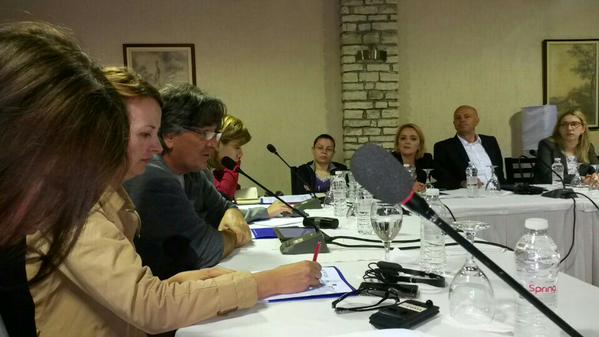Hüttemann: Start accession negotiation on justice and freedom with Serbia!
The Balkans remains a fragile „Europe in a nutshell“. However, what happens when representatives of ethnic Serbs from Kosovo are discussing with Croatians, Albanians, Slovenians and Germans on the EU integration process and the future prospects of European integration in their neighbourhood? What happens when the debate is about a state not recognised by all EU countries and which seems to be in a deadlock? At the same time, with Serbia being unsure whether negotiations will start any time soon, what is the likely route forwards for this region? The Serbian European Movement and the Kosovo Foundation for Open Society organised a debate on this very subject from 26 – 29 April. EM Serbia invited more than 30 Serbs from Kosovo and EU experts from the Western Balkans and the European Movement international to the Albanian coast to a regional conference on „European Union and Western Balkans: the Basics at the Beginning.“
EMI Vice President, Bernd Hüttemann, who is also Secretary General of EM Germany in Berlin, outlines some reflections on his experience at this event:
Stability and prosperity through co-operation and integration is one of the key demands of the European Union in the Western Balkans. However, in South East Europe people are struggling day by day with unemployment, low income and corruption. And even ‘Europe’ no longer seems to be a solution to these challenges. The EU itself is struggling.
Yes, the armed conflicts are over, but despite high levels of EU investment in the region, relations between local ethnic communities remain fragile. Among the population there is a feeling of being forgotten by the rest of Europe. Help to create good administrative governance doesn’t necessarily lead to satisfaction. Many generations remain without hope for the future – also an experience shared by other EU member states, such as Greece.
It is necessary to link the internal debate in the EU on immigration with the debate on democracy and pluralism all over Europe. Free movement of persons without visas has a positive impact on trade and growth and can help establish trust in the ‘old’ EU. Currently, widespread dialogue contests that the EU doesn’t want change in Kosovo and that it would rather somehow keep the population under control by denying visa entry. We should not forget that – together with Turkey, Ukraine, Russia and Belarus – Kosovo is one of the very few countries left in Europe where citizens still require a visa for travel to the EU. Simultaneously immigration has become such a negative issue within many EU member states that it is seriously harming the reputation of the EU in Kosovo.
#eurmove 2 foster regional European integration including Kosovo https://t.co/6pc0bWqbxV pic.twitter.com/OvA7W8AH0c
— Bernd Hüttemann (@huettemann) April 27, 2015
Overall, we must criticise the lack of “public diplomacy” and empathy for public opinion in different member states, as well as in accession countries such as Serbia. Statism is too wide spread in the accession process with only a very few civil servants and some Parliamentarians involved in the negotiation process in Europe’s capitals. At the same time the public audience hardly understands the harsh and populist statements of politicians while technical chapters in the accession deals remain even more of an enigma.
The European Movement in Germany and in Serbia already started several initiatives last year to widen the horizontal political debate on the negotiation process. This means involving civil society organisations from both Germany and Serbia, including business associations and trade unions in the debate, as best practice. In this way the negotiation process will find a wider audience and be better understood. Better informed and involved stakeholders will also help state officials and politicians to formulate a clear strategy for the accession process.
Dinner with #serbiaeu accession negotiation team. Always impressing the work ethics to change governance of an entire country
— Bernd Hüttemann (@huettemann) April 27, 2015
A transparent and clear accession process is also something the European Movements in Serbia, Montenegro and Albania are striving to achieve regarding their own National Conventions, by involving all domestic civil society stakeholders, while also cooperating at the wider regional level.
Obviously the Kosovo question remains to be solved and the European Union remains divided on this issue. Despite this, the overwhelming popular perception is that this purely political question will be solved. The danger lies in whether a solution can be reached between Priština and Belgrade within the timeframe of the accession and reform process of Serbia.
Having written my Master’s thesis on the Europeanisation of the autonomous status of German speaking South Tyrol in Italy, I was always confused by how little creativity was used to break the vicious cycle of separation and good governance for minorities. Now with so much turmoil in the EU it becomes more and more difficult to come to an agreement on the issue at hand:
The EU and the German government have to rethink the visa regime for Kosovo. Her citizens need to feel more trusted by the rest of Europe.
Concurrently, the negotiation chapters with Serbia on “Judiciary and fundamental rights, Justice, freedom and security” should be opened now, as they will be closed quickly. Moreover, these chapters 23/25 are essential to the development of practices of good governance and to fight corruption.
Lastly, the debate needs to be opened to a wider public. European accession politics is domestic politics. The struggle over TTIP shows that statist negotiations between few civil servants always lead to mistrust among the public. To satisfy this, we need a better governance and public communications in Brussels and national capitals like Belgrade and Berlin.
EMI Vice President Bernd Hüttemann spoke on Monday 27 April in a panel discussion with Marina Jovićević, Assistant Minister of Foreign Affairs and Ksenija Milenković, Director of the European Integration Office in Belgrade; moderated by Maja Bobič, Secretary General of EM Serbia and EMI’s Board member.







